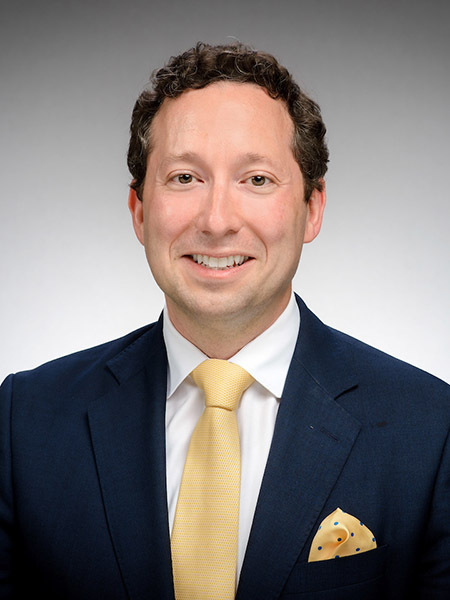Economist Kirk Doran wins UK’s Panmure House Prize honoring interdisciplinary research

Kirk Doran, an associate professor in the Department of Economics at the University of Notre Dame, has won the 2024 Adam Smith Panmure House Prize.
Established in 2021, the prize is named after the forefather of economics and celebrates those who embody his empiricism and long-term interdisciplinary thinking in their research. One of the United Kingdom’s largest academic prizes open to researchers globally, it has been awarded to emerging academic leaders across multiple disciplines, including a business academic, a neurologist and an anthropologist.
“I feel honored and privileged to win the Panmure House Prize. Adam Smith has been an inspiration to me since the first time I began studying social structures and the economy as an undergraduate,” Doran said. “I am particularly inspired by the prize’s aim to explore the relationship between long-term thinking and radical innovation. This is exactly what our current incentive structures both within and outside academia under-incentivize, and that is why Panmure House’s work is so essential here.”
Like Smith, Doran asks fundamental questions that are often hard to find a definitive answer to because they are so overarching. In his research, Doran seeks to identify where and how new knowledge is created in order to ultimately find the cause of long-term per capita economic growth.
Through his subfield of innovation economics, Doran aims to use techniques developed by modern labor economists to answer questions that had been long debated without progress until these techniques were developed. He has applied empirical tactics to measure knowledge generation through bibliometric analysis of interdisciplinary databases — such as papers, patents and medical trials.
His studies find that the development of new knowledge is ultimately based on collaborative relationships in which people inspire and challenge one another.
“We are delighted to see Kirk Doran’s research receive this international recognition,” said John T. McGreevy, the Charles and Jill Fischer Provost. “The Panmure House Prize’s emphasis on long-term, interdisciplinary thinking mirrors the University of Notre Dame’s commitment to scholarly innovation and excellence across the disciplines.”
Doran was one of four finalists from leading global institutions to be considered for the Panmure House Prize. He was supported in pursuing the award by the Office of the Provost and the College of Arts and Letters’ Institute for Scholarship in the Liberal Arts.
With this recognition, Doran plans to continue examining how new knowledge impacts per capita economic growth with a multidisciplinary team. He hopes it will have a policy impact that can benefit productivity.
“I think my research will help to refocus our policy efforts regarding long-term economic growth to the encouragement of deep collaboration among innovative people,” he said. “It is not enough to better educate our workforce or even produce more entrepreneurs, scientists and inventors; such efforts could not possibly produce long-run economic growth unless these individuals enter periods of deep collaboration with each other in the joint production of knowledge.”
Originally published by at al.nd.edu on Oct. 7.
Contact: Tracy DeStazio, associate director of media relations, 574-631-9958 or tdestazi@nd.edu
Latest Colleges & Schools
- When countries hide their true public debt, they hurt themselves, their citizens and their lendersGlobal public debt may soon collectively catch up to the worldwide gross domestic product (GDP), likely matching it by 2030. New research from a Notre Dame economist suggests that this could happen even sooner, thanks to countries’ hidden debts. This misreported debt can lead to higher interest rates for borrowers and lower recovery rates for lenders, suggesting indirect adverse effects on global financial stability and consumer welfare.
- WSJ editor and columnist Gerry Baker to deliver Thomas H. Quinn LectureGerry Baker, editor-at-large of The Wall Street Journal, is the featured speaker for the Thomas H. Quinn Lecture Series. “Unpacking the Election: Where Do We Go From Here?” will take place at 3:30 p.m. Friday (Nov. 8) in the Jordan Auditorium at the University of Notre Dame’s Mendoza College of Business.
- Gov. Ron DeSantis to deliver Center for Citizenship and Constitutional Government lectureGov. Ronald D. DeSantis, the 46th governor of Florida, will speak at the University of Notre Dame at 4 p.m. Nov. 8 in Room 101 of DeBartolo Hall. Sponsored by Notre Dame’s Center for Citizenship and Constitutional Government, the talk will serve as the center’s 2024 Jeanie Poole O’Shaughnessy Memorial Lecture.
- Democrats and Republicans agree on one thing: Censoring hate speechIn an era of intense polarization, Democrats and Republicans have historically, and mistakenly, believed that members of the other party prioritize protecting certain types or victims of hate speech over others based on stereotypes or their affiliation with those potentially vulnerable groups. New research from the University of Notre Dame, however, revealed that partisans generally agree on what to censor when it comes to the target, source and severity of hate speech.
- Political scientist explores extending constitutional duties to private actorsNew research from Christina Bambrick, the Filip Family Assistant Professor of Political Science at Notre Dame, explores the nonconventional idea that each of us, as private citizens, may be responsible for upholding the constitutional rights of our fellow citizens. She examines constitutional politics across the globe to explore these different approaches to balancing rights and responsibilities in a democratic society.
- Six new faculty join psychology department to advance research on mental health, other disordersThe Department of Psychology at the University of Notre Dame has hired six new faculty members this year, a significant expansion of a field that is core to the University’s commitment to fighting the U.S. mental health crisis.












